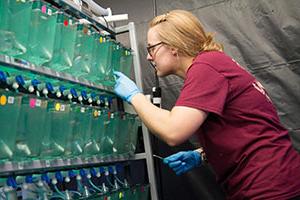Aquaculture and Aquarium Science
Aquarium and Aquaculture Science are rapidly growing areas within the field of marine biology. There is need for people trained in raising and caring for aquatic animals and the RWU AQS program, one of the first in the nation, effectively fills that void.
Aquaculture of marine and fresh water fish and invertebrates, already important as a food supply, is projected to increase in the future becoming one of the main sources of food for the world. Aquarium science is a multi-billion dollar, world-wide business that encompasses trade and display of ornamental animals. Diseases of aquatic animals is a limitation in maintaining animals in both aquariums and aquaculture. The AQS minor offers both didactic and experiential, hands-on learning and will prepare the student for entry into this diverse and growing field.
New Programs Coming 2025: Undergraduate Certificate and Graduate Programs
The RWU Aquarium Science faculty and staff are developing new programs in collaboration with The Aquarium Vet and we anticipate the announcement of a new undergraduate certificate and graduate program in Aquarium Science for the 2025 academic year. Please contact Andrew Rhyne arhyne@inkatana.com for more information as it becomes available.
Degree Requirements
Aquarium Science learning outcomes:
- Explain and synthesize concepts needed to care and raise aquatic animals, develop aquatic animal care systems and manage aquatic animal care facilities.
- Develop questions and hypotheses, and conduct experimental, field-based and descriptive research in basic, applied and interdisciplinary sciences.
- Use data, scientific literature, and evidence-based reasoning to analyze biological and environmental systems across spatial and temporal scales.
- Communicate scientific information verbally, in writing, and visually to diverse audiences including scientists and non-scientists.
- Discuss interactions between science and society, including human-environment relationships, ethical aspects of scientific research, and using evidence-based decision-making to propose solutions to important issues in society.
- Apply their knowledge and scientific competencies to their own personal and professional development, and to engage in their communities.
Guaranteed Research Opportunities
 Undergraduate research is integrated into the Aquarium and Aquaculture Sciences curriculum, with opportunities for students to earn academic credit for doing research, to develop proposals and compete for small grants to fund their projects, and to present their findings at regional, national and international conferences. These studies often involve contact and interaction with industry members, and are conducted using the state-of-the-art laboratories at RWU that include a production-scale shellfish hatchery, an extensive marine ornamental research facility and an aquatic animal veterinary laboratory.
Undergraduate research is integrated into the Aquarium and Aquaculture Sciences curriculum, with opportunities for students to earn academic credit for doing research, to develop proposals and compete for small grants to fund their projects, and to present their findings at regional, national and international conferences. These studies often involve contact and interaction with industry members, and are conducted using the state-of-the-art laboratories at RWU that include a production-scale shellfish hatchery, an extensive marine ornamental research facility and an aquatic animal veterinary laboratory.

